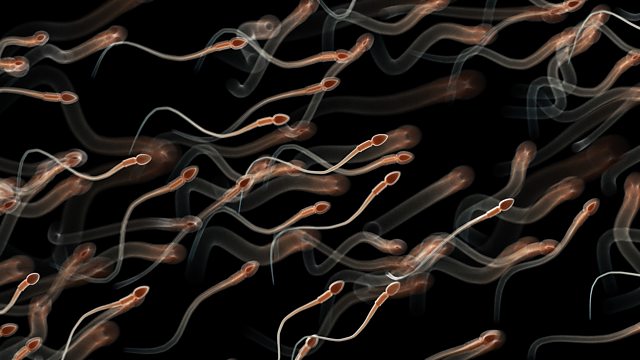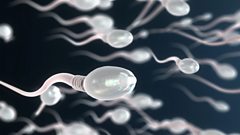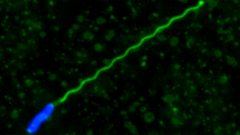Will giving up alcohol improve my sperm count?
When planning to have a baby, women are expected to give up a lot. But is there evidence men should give up alcohol, coffee and other vices to improve their chance to conceive?
When planning to have a baby, women are expected to give up everything from smoking to alcohol, even soft cheese. But the other half of fertility comes from the sperm, usually provided by a man. So should men also give up their vices to improve the quality of their sperm, and their chances of conception?
That’s what Listener Stuart in Australia wants to know. He emailed CrowdScience after he and his wife had been trying to have a second child for two years. He gave up alcohol, and coffee, but wants to know if there is any hard science to back up the idea that this would improve his fertility.
To find out, presenter Anand Jagatia speaks with Professor Allan Pacey, a scientist who specialises in the study of male fertility and sperm. He discovers that male subfertility accounts for 50% the problems with getting pregnant. And we’re far from alone. Sperm is a remarkably diverse, but also fragile cell. Across the animal kingdom, different species have problems with male fertility, but have adapted novel ways to improve their chances of reaching the egg.
Men often struggle to speak about their fertility, and reporter Chhavi Sachdev tells Anand the impact this has on couples in India who struggle to conceive, or don’t want to. She speaks with fertility specialist Professor Nirmal Kumar Lohiya about how this reticence to speak about fertility is changing.
Viruses from Mumps to HIV have long been known to target the delicate sperm production cells in the testicles. Dr Krutika Kuppalli tells Anand why, and what we know about the possible impact of SARS CoV-2 on male fertility.
Professor Allan Pacey gives Anand and Stuart some advice for what to do while trying to conceive - don’t wear tight underwear - and get used to talking about your swimmers or even getting them checked out.
Contributors:
Professor Allan Pacey - Andrologist at the University of Sheffield in the UK.
Dr Nicolla Hemmings, expert on bird sperm, Royal Society Dorothy Hodgkin Research Fellow at the University of Sheffield, UK.
Professor Nirmal Kumar Lohiya, Fertility specialist and co-developer of RISUG male contraceptive, University of Rajasthan, India
Dr Krutika Kuppalli, Assistant Professor at the Medical University of South Carolina, USA
Chhavi Sachdev, Reporter and presenter for CrowdScience
Presented by Anand Jagatia,
Produced by Rory Galloway
(Image: Sperm cells Credit: Getty images)
Last on
More episodes
Clips
-
![]()
Covid-19 and male fertility: What do scientists know so far?
Duration: 02:11
-
![]()
The many shapes of animal sperm
Duration: 04:08
Broadcasts
- Fri 29 Jan 2021 20:32GMTΒι¶ΉΤΌΕΔ World Service Americas and the Caribbean, UK DAB/Freeview, News Internet, Online & Europe and the Middle East only
- Fri 29 Jan 2021 21:32GMTΒι¶ΉΤΌΕΔ World Service Australasia, South Asia & East Asia only
- Sun 31 Jan 2021 08:32GMTΒι¶ΉΤΌΕΔ World Service Americas and the Caribbean, UK DAB/Freeview, Online & News Internet only
- Sun 31 Jan 2021 23:32GMTΒι¶ΉΤΌΕΔ World Service East and Southern Africa & West and Central Africa only
- Mon 1 Feb 2021 04:32GMTΒι¶ΉΤΌΕΔ World Service
- Mon 1 Feb 2021 11:32GMTΒι¶ΉΤΌΕΔ World Service
- Mon 1 Feb 2021 18:32GMTΒι¶ΉΤΌΕΔ World Service East and Southern Africa & West and Central Africa only
Podcast
-
![]()
CrowdScience
Answering your questions about life, Earth and the universe




